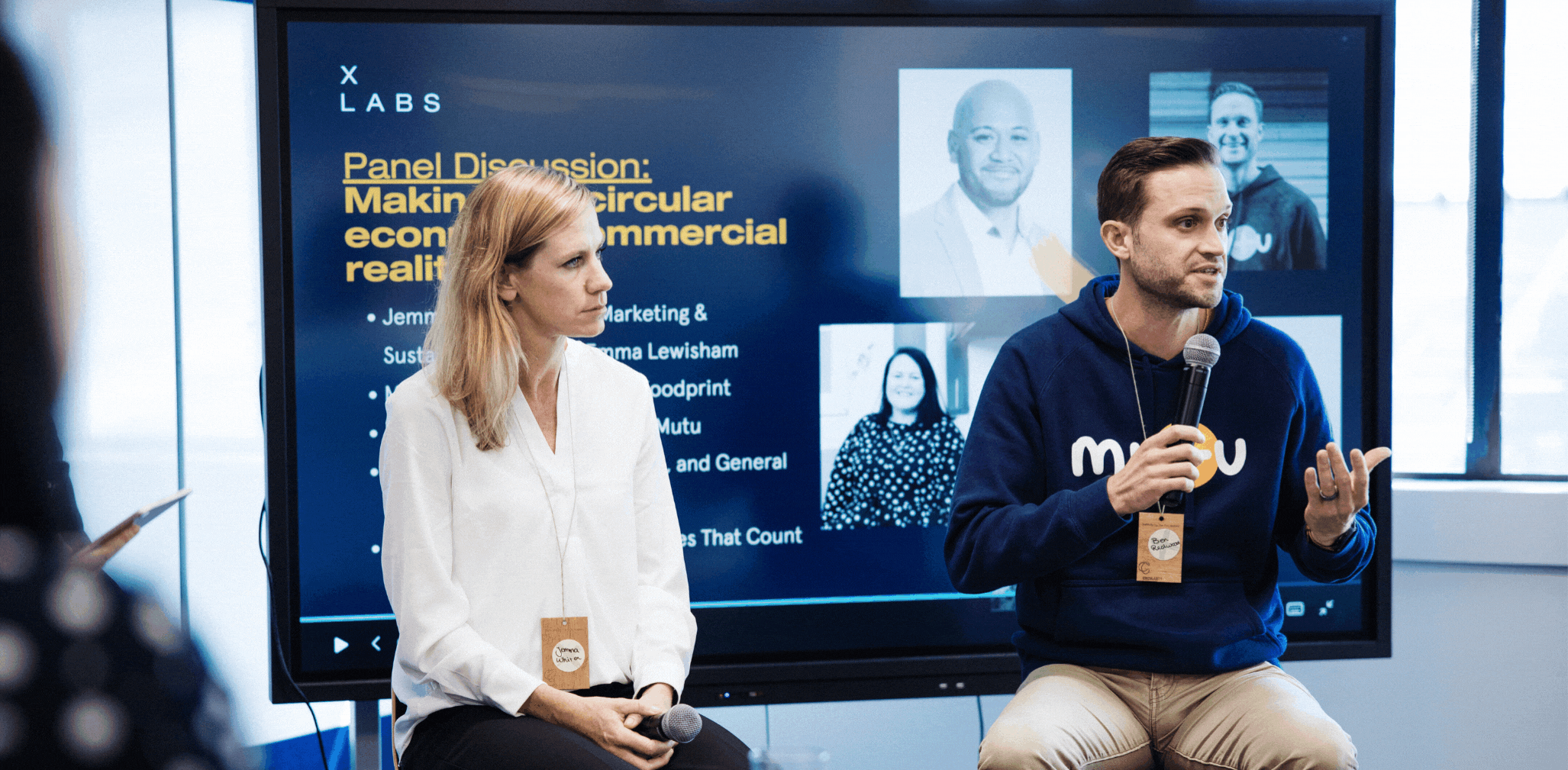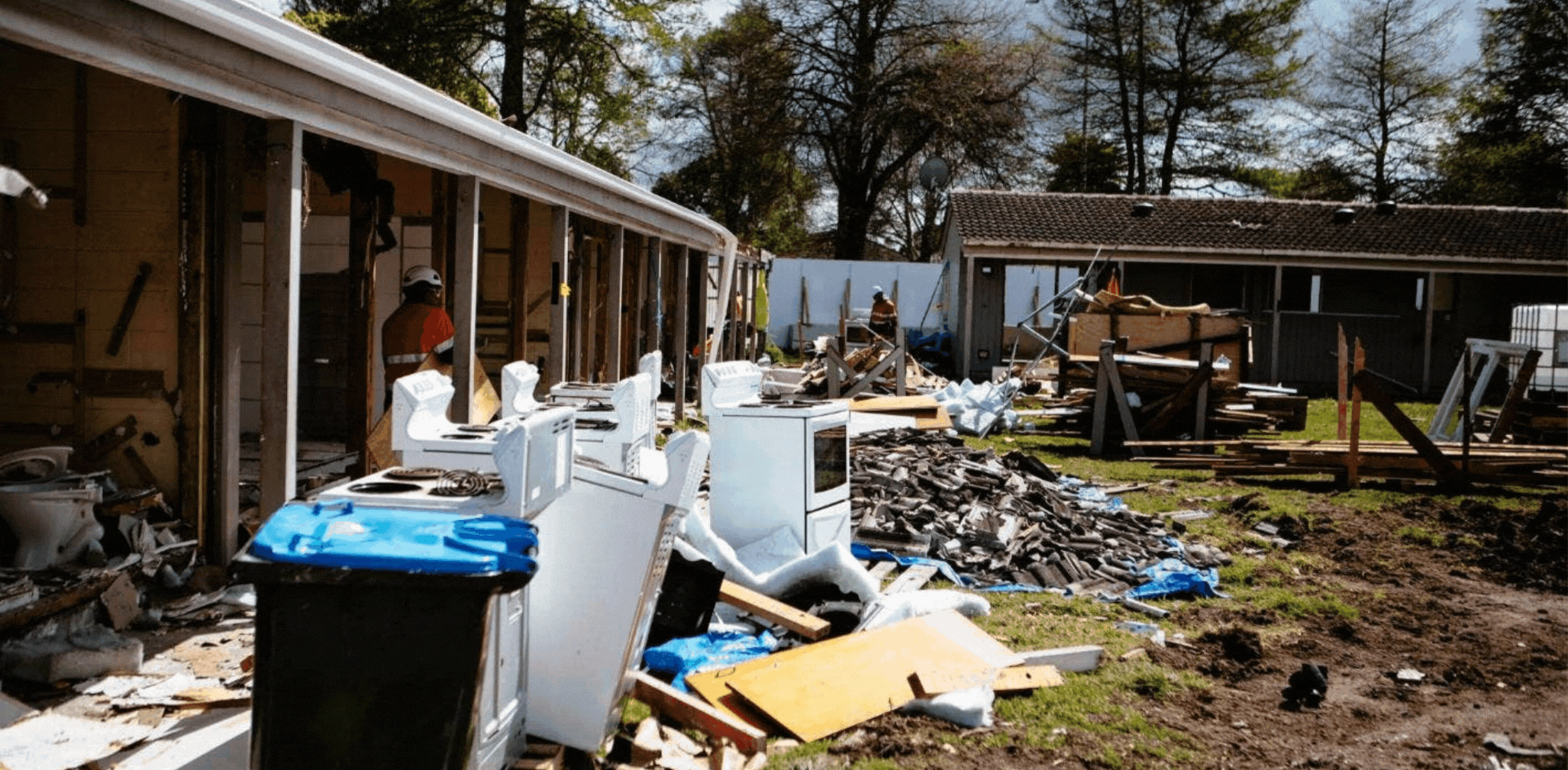Realising the commercial opportunity of the circular economy
The circular economy is big business. With a global estimated value of $4.5trillion, and less than 8% of the world currently being circular, the opportunities presented by a widespread shift to this economic paradigm are staggering.
A 2018 report estimated that not only could Auckland reduce emissions by 2.7 Mt CO2-e by embracing a circular economy, but the city could also add NZ$8.8 billion in additional economic activity by 2030.
Imagine the possibilities if we could grow the circular economy for everyone in Aotearoa?
In recent years, we have seen businesses like premier fashion subscription service Rent the Runway hit US$1B in turnover and second-hand clothing marketplace Vinted reach US$4.53B, while our very own Mint Innovation, a company that recovers valuable metals from waste streams received nearly US$14M in their Series B funding round.
It’s not just new products and services that are realising new value. With nature’s contribution to the global economy worth more than $125 trillion annually, building conservation, regeneration, and nature-based solutions into projects represents a unique opportunity for businesses. Nature-based solutions and conservation activities give businesses the possibility to lower operational costs, to unlock new revenue streams, to increase customer engagement, rescue emissions, and deliver environmental goods and services.
However it is not always easy to adapt circularity into a linear world. Representing a significant deviation from the status quo, becoming regenerative by design is a practice and a process, requiring ambition, perseverance, hard work, and the sharing of knowledge.
We invited five business owners and operators to speak at New Zealand’s circular economy training program, XLabs, for a panel discussion exploring the question:
How can we best commercialise the circular economy opportunity in Aotearoa?
Representing luxury skincare, food rescue, asset rental and exchange, tree planting, and the deconstruction sector, panellists were moderated by Louise Nash, Founder and CEO of Circularity. Some of their advice and highlights of the discussion are summarised under four broad themes below.
Setting big, hairy, audacious goals
When you set goals for incremental progress, you only get incremental progress. Even at the risk of falling short, setting moonshot goals will take you a lot further.
A transition towards a circular economy requires radical changes from the way we have become used to doing business. Half measures are not going to get us there. Panellist Jemma Whiten set the tone early on around the magnitude of change required, by sharing the story of when she was working at Unilever, and CEO Paul Polman announced in 2009 that they were going to double the size of the business while halving its environmental footprint. While at first, they were shocked, it wasn’t long before employees rallied around the idea and wanted to be part of it. Jemma explained that the stretch goal made shareholders, employees, suppliers, and other external think beyond the bounds of the status quo. Nine years later, Unilever had over-shot on both goals.
Jemma now works for luxury skincare company Emma Lewisham, which in achieving its own moonshot has recently announced it is officially the world’s first carbon-positive beauty brand, with the world’s first 100 percent circular-designed product range. The move has even attracted the endorsement of the iconic environmentalist and United Nations Messenger of Peace, Dr Jane Goodall and is now stocked on Gwyneth Paltrow’s Goop platform.
Ben Redwood describes a big, hairy, audacious goal as a company’s North Star. The founder of asset exchange, rental service, and marketplace, Mutu, Redwood explained that in startups the value proposition can change every six months. The company is two years old, and has pivoted twice already. He believes that having a clear vision means that even as the path weaves and meanders, you know the compass point you’re working towards.
In the VUCA world we find ourselves in — that is Volatile, Uncertain, Complex, and Ambiguous — setting our sites on the distant horizon and knowing where we are going can help us to navigate the stormy seas we encounter along the way.
Grounding our economy in our values
We already have the technology we need to tackle the climate crisis; we just need to shift our mindset in order to fund and prioritise urgent action.
Redwood elevated the clear message delivered by the IPCC in recent reports, that humanity already has all the technology solutions we need to address climate change; it is politics, money, and our mentality that is standing in the way. Earlier in the day, one of the XLabs participants had remarked that it is alarming that for many of us, it took a global pandemic to make us realise that we needed to spend more time with our friends and family. It is all about how we prioritise our time and the decisions we make, to shape a different future.
Our current economic paradigm tells us that time is money, and conversations about our values and the purpose of our businesses are often pushed aside in order to ship the next product, triple revenue, or beat a competitor to market. Saia Finau Latu, Founder and CEO of the deconstruction business TROW Group, spoke about his ways of doing business differently. He has created dozens of jobs for young Māori and Pasifika in the deconstruction sector — that is, taking a few extra days to properly deconstruction a building and salvage the useful materials, rather than bulldozing it all and sending it to landfill.
Latu voiced that there is frequently a chasm between business and the public, both thinking that they know best how problems should be solved. He believes that in order to transform business, we need to sit down and talk openly about the problems we are facing within the economy and waste, and explore how we solve solutions together with informed product design, and more community housing projects the likes of which are being driven by Kāinga Ora. These conversations should be grounded in our values, as the basis for the new economic paradigm that we envision for Aotearoa.
In the face of the prospect of highly technological futures for Auckland and beyond, Saia did not mince his words:
“The idea of robots looking after us when we’re old? How is that, culturally, for Māori and Pasifika people? I don’t feel that’s the future for our people.”
— Saia Finau Latu, Founder and CEO, TROW Group
Robyn Haugh, CEO of Project Crimson Trust and Trees That Count, spoke about her work trying to shift the predominant narratives around tree planting in Aotearoa. With the current incentives in the Emissions Trading Scheme favouring the planting of pine trees over natives, she emphasises the need to stick to a consistent narrative rooted in our values, in order to change mindsets. The challenge, as she sees it, is to encourage people to understand that the value in planting trees is about much more than just financial return.
“It’s not just all about carbon and offsetting, because offsetting doesn’t take us back to positive. It’s about being positive and additive. Our biggest challenge is having those conversations, telling that story and bringing people along on the journey”
— Robyn Haugh, CEO of Project Crimson Trust and Trees That Count
Data is gold: Making the invisible visible
Good quality data helps to unlock new value in the circular economy, making the invisible visible, helping both businesses and customers to understand the nature and magnitude of our waste challenges as well as connecting challenges with solutions to deliver measurable impact.
Michael Garvey is Founder and Director of Foodprint, a food rescue app that sends alerts to users when surplus food becomes available at their favourite cafes and eateries. The service matches food that would otherwise go in the bin with customers who are conscious of the issue of food waste and happy to get lunch for a discounted price. It’s a massive problem to address — roughly one third of all food produced globally goes to waste.
Garvey explained to the XLabs audience that a huge amount of Foodprint’s efforts goes into collecting baseline data from the hospitality and food retail sectors. Referencing the Sustainable Development Goal 12.3 to halve per capita food waste by 2030, she pointed out that we cannot know how much we are reducing food waste unless we understand the magnitude of the problem in the first place.
Food waste data assists businesses with making good decisions, but making it visible to customers is also crucial in changing consumer mindsets. Getting that notification on your phone, along with an image of the meals available in the cafe down the road, really makes the food waste issue tangible for consumers — people can clearly see just what is going to be otherwise thrown away, increasing awareness of the problem. Along with total dollars saved, the Foodprint app also provides details to users on the amount of carbon emissions they have reduced by rescuing food destined for landfill.
Redwood framed the issue of waste as a data problem, explaining that 80% of Mutu’s customers were throwing things away that they thought could be reused - the problem is they didn’t know who might want them. The platform matches those who have assets sitting unused with those who need them — they manage everything from top quality printers and specialised scientific equipment, to surfboards or tools sitting unused in your back shed, that might be just the thing that your neighbour needs on a Saturday morning. At the core of Mutu’s solution lies the question: If you need something for your business or personal use, how can you check if you already have it as an organisation, or if someone else has the exact thing that you’re looking for, that you can borrow for a day, or a week?
Over a period of four years, Latu and his team gathered a wealth of data relating to the deconstruction of houses and other buildings. Wishing to be of service to Aotearoa, after moving here from Tonga as a child, he made the decision to provide this data free of charge to Auckland Council, Kāinga Ora, and other services that could make use of it to assist us in the journey towards the circular use of building materials. This sort of goodwill-based cooperation rooted in a mindset of collaboration over competition will be crucial to moving us into a circular economy at speed.
Find your tribe and walk through open doors
Find the people who believe just as passionately as you do in finding a solution to a problem, and you’ll have a coalition of the willing, ready to have your back.
Finding the collaborators and champions that are willing to walk the circular path with you is crucial in staying the course. Louise Nash told the story of some sage advice she received from The Mind Lab and Tech Futures founder Frances Valintine, when launching Circularity four years ago. The first was to find others that cared just as passionately about the problem, particularly those who were in government; the second, to go through open doors.
When you are operating at the forefront of transformative change, it can be a lonely place, and many of the doors you knock on will yield disappointing results. You can waste a lot of time and energy knocking on the wrong doors. The key is finding the doors that are open, and running through them.
“When you get a yes, or a ‘that looks interesting’, don’t let go of that. Run with that, keep meeting with that person and keep having those conversations.”
— Louise Nash, Founder and CEO, Circularity; Co-founder, XLabs
For Nash, that open door came in the form of Whiten who was working with EcoStore at the time and became her first client. Whiten reiterated the importance of finding others with similar ideas to you, particularly if your ideas are so seemingly whacky that the majority of people disregard them. She explained that such allies on the journey may ask different questions, give you different perspectives, and help you break down your problem. She stressed the importance of talking to your customers and early adopters, saying that some of the best ideas and breakthroughs come from them.
In the beauty industry, Whiten believes that many consumers are ahead of companies in what they expect from brands from a sustainability perspective. To achieve full circularity for their products, Emma Lewisham asks customers to return their packaging once their products have been used. Whiten shared that this has created a potent connection with their customer community and that often the packaging is accompanied by a handwritten note from people excited to be able to participate in such a circular business solution.
Finding the open door was a long time coming for Latu. He shared with the audience the challenges of doing business as a Pasifika person, and how we kept getting up every morning, smiling, and knocking on doors. As he tells it, he “knocked on 99 doors before one opened”.
Garvey describes herself as naive when she started Foodprint, thinking that surely everybody would want to be on this platform. She realised after much door-knocking of her own that you need to bring your champions with you and that the hustle can be harder than you expect.
“Some of my favourite eateries on the platform are those that have said no to us for whatever reason, but then come back to us 6-12 months later and want to join.”
— Michal Garvey, Founder and Director, Foodprint
For Haugh, technology is the enabler that connects her with her community, many of them spread across the globe. She explained that a lot of the donations that come through Trees That Count come from international donors who want to give back to New Zealand after visiting. By leveraging the stories of the communities in which trees are planted, and the people doing the planting, Trees That Count is able to keep the community motivated and inspired.
A transition toward a circular economy requires some brave leadership from businesses that are willing to question, break apart, and redesign the status quo. Finding willing partners who can help you to journey towards bold, audacious goals with data-driven approaches is a good start towards making our circular future a reality.
—Written by Alina Siegfried





